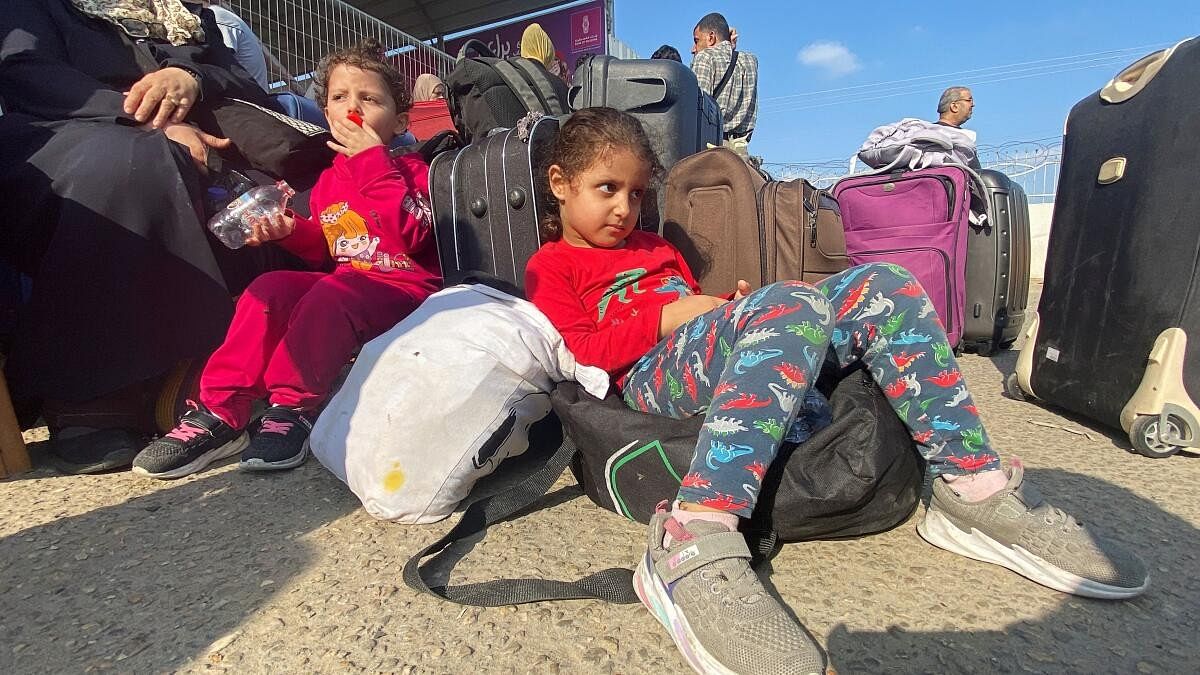
Palestinian children with dual citizenship wait outside the Rafah border crossing with Egypt, in the hope of getting permission to leave Gaza, amid the ongoing conflict between Israel and Palestinian Islamist group Hamas, in Rafah in the southern Gaza Strip, November 1, 2023.
Credit: Reuters Photo
By Marc Champion
The problem with ignoring dead-end signs is that you eventually end up at the bottom of an alley with nowhere to turn. This is where Israel’s government now finds itself, and a leaked document shows how some in the ruling elite are thinking this lack of options through. It’s not pretty.
The Oct. 13 draft document called “Policy Paper: Options for a Policy Regarding Gaza’s Civilian Population’’ comes from Israel’s Intelligence Ministry. It recommends expelling the strip’s population to Egypt’s Sinai desert and locking the door behind them as the best way to secure Israel’s long-term interests.
Other territorial disputes have been ended by expulsions or exchanges of populations, most recently in Azerbaijan’s Nagorno Karabakh enclave. The practice, sadly, isn’t that uncommon, but it’s called ethnic cleansing and is what the international community fought hard to prevent during the Yugoslav wars of the 1990s. Even to entertain the idea in a policy paper suggests that Israel’s government has not recognized where its zero-sum approach to the Palestinian question went wrong. And that’s worrying because the geopolitical ramifications of this dispute run wide and deep. At some point, either this government or a replacement will have to throw its pre-war policies into reverse.
First, some disclaimers. The Intelligence Ministry in Israel is much, much less important than analogues elsewhere. It is in essence a research center under the prime minister’s office, and very much the runt of the litter among the nation’s fabled, if currently bruised, security organs. So, although the government has confirmed the document’s authenticity to a range of media, it also downplayed its importance, describing it as a concept paper that hadn’t been discussed outside the ministry.
In other words, the Biblical expulsion of more than 2 million people isn’t government policy and is unlikely to happen. But in a world where Russia invades Ukraine against its obvious self-interest, and the US is considering re-electing Donald Trump as president, it’s foolish to count on common sense prevailing. The paper is worth reading mainly because it shows the intellectual bankruptcy of parts of the government and adds to the growing debate within Israel over whether Prime Minister Benjamin Netanyahu and his ultra-right coalition are the best people to deal with the crisis caused by Hamas’ Oct. 7 killing spree, in which more than 1,400 Israelis were butchered.
The paper (a translation is here, on the website that broke the story) outlines three possible scenarios for the day after the war. Option A is to withdraw after dealing with Hamas and install the more moderate Palestinian Authority in its place. Option B would be to withdraw and then ask a coalition of Arab nations to organize a post-Hamas administration in Gaza. C would move the civilian population across the border into Egypt for their safety, and then not let them back.
There are obvious reasons why option C is unlikely to happen, beginning with the fact that if there’s one thing Egyptians agree on, it’s that they don’t want to take on millions of Palestinian refugees. A second is that this would in effect repeat Israel’s 1948 expulsion of up to 700,000 Palestinians from their homes, a source of instability ever since. It would serve as a call to arms for Palestinians in the West Bank and Arabs across the region, not to mention Iran and its allies. For that reason, if no other, it is unlikely the US or still less Europe would endorse such a solution, leaving Israel in a very lonely position indeed.
It is the paper’s reasoning that’s of interest. It goes through the obstacles to each scenario and concludes that the first suggestion — putting the Palestinian Authority in charge of Gaza — would be the most dangerous. It would, according to the authors, pose an “existential’’ threat to the state of Israel, because it would be seen as a victory for Hamas and, unlike in Germany after World War II, there would be no moderate opposition to Hamas in Gaza to facilitate the area’s “de-Nazification.’’ A new Hamas generation would take charge and restart attacks on Israel, which would then find it difficult to recruit soldiers from a demoralized population. Option B is ruled out for similar reasons.
The potential downsides to C aren’t discussed, other than to acknowledge that Israel would have to work hard to persuade the US and other allies of the policy’s legitimacy, which is, of course, an understatement. The hope, according to the paper, is that unlike the other options, what amounts to ethnic cleansing would help Israel solve the Gaza problem once and for all and deter Hezbollah from attempting an attack on Israel from the North, given the dire consequences that befell Gaza when Hamas did the same.
I don’t envy Israel’s decision makers. A policy that fed Hamas and encouraged the expansion of Jewish settlements on the West Bank to weaken the more moderate Palestinian Authority has left the government with no good choices. It needs to punish and defeat Hamas, all while preventing the war’s expansion and sparing the civilians Hamas has used as a key part of its defenses, not to mention the 238 hostages still in captivity.
It’s an impossible task — according to Gaza’s health authority the death toll from Israel’s retaliation is already over 8,000 — and it needs a far-sighted strategy to have any chance of success. But a second “Nakba,’’ or catastrophe, as the Palestinians call their 1948 expulsions, is neither an effective nor an acceptable way to ensure Israel’s security.